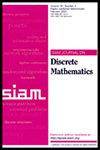Maximum Matchings and Popularity
IF 0.9
3区 数学
Q2 MATHEMATICS
引用次数: 0
Abstract
SIAM Journal on Discrete Mathematics, Volume 38, Issue 2, Page 1202-1221, June 2024.Abstract. Let [math] be a bipartite graph where every node has a strict ranking of its neighbors. For any node, its preferences over neighbors extend naturally to preferences over matchings. A maximum matching [math] in [math] is a popular max-matching if there is no maximum matching more popular than [math]. In other words, for any maximum matching [math], the number of nodes that prefer [math] to [math] is at least the number of nodes that prefer [math] to [math]. It is known that popular max-matchings always exist in [math] and one such matching can be efficiently computed. In this paper we are in the weighted setting, i.e., there is a cost function [math], and our goal is to find a min-cost popular max-matching. We prove that such a matching can be computed in polynomial time by showing a compact extended formulation for the popular max-matching polytope. By contrast, it is known that the popular matching polytope has near-exponential extension complexity and finding a min-cost popular matching is NP-hard. We also consider Pareto-optimality. Though it is easy to find a Pareto-optimal matching/max-matching, we show that it is NP-hard to find a min-cost Pareto-optimal matching/max-matching.
最大匹配度和人气
SIAM 离散数学杂志》,第 38 卷第 2 期,第 1202-1221 页,2024 年 6 月。 摘要设 [math] 是一个双方图,其中每个节点都对其邻居有严格的排序。对于任何一个节点,它对邻居的偏好自然扩展为对匹配的偏好。如果没有比[math]更受欢迎的最大匹配,那么[math]中的最大匹配[math]就是受欢迎的最大匹配。换句话说,对于任何最大匹配[math],喜欢[math]而不喜欢[math]的节点数至少是喜欢[math]而不喜欢[math]的节点数。众所周知,[math] 中总是存在流行的最大匹配,而且可以高效地计算出这样的匹配。本文采用加权设置,即存在一个成本函数 [math],我们的目标是找到一个成本最小的流行最大匹配。我们通过展示流行最大匹配多面体的紧凑扩展公式,证明这种匹配可以在多项式时间内计算出来。相比之下,众所周知,流行匹配多面体具有接近指数的扩展复杂度,而找到最小成本的流行匹配是 NP 难的。我们还考虑了帕累托最优性。虽然找到帕累托最优匹配/最大匹配很容易,但我们证明找到最小成本的帕累托最优匹配/最大匹配是 NP 难的。
本文章由计算机程序翻译,如有差异,请以英文原文为准。
求助全文
约1分钟内获得全文
求助全文
来源期刊
CiteScore
1.90
自引率
0.00%
发文量
124
审稿时长
4-8 weeks
期刊介绍:
SIAM Journal on Discrete Mathematics (SIDMA) publishes research papers of exceptional quality in pure and applied discrete mathematics, broadly interpreted. The journal''s focus is primarily theoretical rather than empirical, but the editors welcome papers that evolve from or have potential application to real-world problems. Submissions must be clearly written and make a significant contribution.
Topics include but are not limited to:
properties of and extremal problems for discrete structures
combinatorial optimization, including approximation algorithms
algebraic and enumerative combinatorics
coding and information theory
additive, analytic combinatorics and number theory
combinatorial matrix theory and spectral graph theory
design and analysis of algorithms for discrete structures
discrete problems in computational complexity
discrete and computational geometry
discrete methods in computational biology, and bioinformatics
probabilistic methods and randomized algorithms.

 求助内容:
求助内容: 应助结果提醒方式:
应助结果提醒方式:


